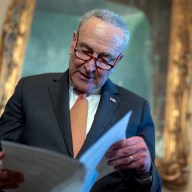OTTAWA – The country’s top military commander reversed himself Wednesday and put rising pressure on the government with the explosive assertion that a beaten and bloodied Canadian-captured prisoner was indeed abused by Afghan authorities prior to 2007.
The stunning about-face by Gen. Walt Natynczyk – who had earlier insisted Canadians had not detained the suspected Taliban in June 2006 – undercuts one of the Conservative government’s key lines of defence in the widening controversy over the handling of insurgent prisoners.
Defence Minister Peter MacKay has categorically insisted “there is not a single, proven allegation” of abuse prior to 2007.
Prime Minister Stephen Harper brushed aside the revelation by saying it “confirms what we have been saying all along.”
But, in a recalibration of the government’s position, Harper told the House of Commons that the military acted when they uncovered “substantive evidence” of abuse. Previously, Harper and MacKay have said there was no such evidence.
Natynczyk’s revelation also raises questions about whether Canada violated international law by continuing to transfer prisoners to Afghan custody after it had evidence of abuse.
The general skirted questions about any potential political fallout and said he’s ordered a board of inquiry investigation into why neither he, nor his predecessor, Rick Hillier, saw a platoon commander’s report which detailed the prisoner’s capture.
A University of Ottawa law professor says the report represents “incontrovertible proof” that Canada should have stopped transfers right away and that continuing the practice means Ottawa has violated international law.
Knowingly transferring a prisoner into a situation where they may face a risk of torture is a violation of the Geneva Conventions and a war crime.
Errol Mendes says the problem was compounded by the fact that Canadians were not monitoring the fate of prisoners between 2006 and 2007. That lapse cannot be laid at the feet of the Canadian military and the government must shoulder the blame, he said.
“If these guys had no clear instructions, and it’s clear they didn’t, they were almost making it up on the fly which shows you the civilian command was putting them into an untenable position,” Mendes said.
MacKay, former defence minister Gordon O’Connor and Foreign Affairs Minister Lawrence Cannon appeared before a special Commons committee later Wednesday and faced pointed accusations by opposition MPs.
Liberal defence critic Ujjal Dosanjh said the government didn’t need specific allegations of torture to act if there was an already overwhelming number of reports warning of the abuse, including memos from diplomat Richard Colvin.
“International law is very clear; you need circumstantial evidence, you don’t need actual knowledge,” Dosanjh said.
“Sir, you continued to transfer prisoners to torture in the name of Canada. It’s important you understand, you don’t need specific allegations.”
MacKay bristled at the accusation.
“That is an outrageous, false, inflammatory and insulting allegation….from somebody who’s served in government and should know better,” he shot back.
“No one ever turned a blind eye. Let me be clear, the government of Canada has never been complicit in torture or any violation of international law by willfully allowing prisoners taken by the Canadian forces to be exposed to abuse.”
The news from Natynczyk inflamed the daily question period in the Commons and prompted demands from all three opposition parties for MacKay to be fired.
“Resign, resign!” Liberals, New Democrats and Bloc MPs chanted at MacKay during a raucous session.
The catcalls were ignored by MacKay, who continued to insist he had no prior knowledge of allegations of abuse including the one now being confirmed by the military.
“I rely on information and advice from senior officials, from the military,” he told the Commons. “This issue came to my attention this morning after I spoke with Gen. Natynczyk. As I’ve said before, when we receive information, we act on the information.”
NDP leader Jack Layton was incredulous.
“Oh, will they stop already,” Layton said. “The prime minister and the defence minister can’t spin their way out of this one.
“The chief of defence staff just contradicted everything they’ve been saying in this House time and time again. The minister claimed there was no proof of abuse. He was wrong and he should take responsibility and resign, and if not, the prime minister should demand it today.”
Natynczyk called a news conference Wednesday to correct information he gave a day earlier about a detainee who was beaten by Afghan police. The general told the House of Commons defence committee Tuesday that Canadian troops had questioned the man in June 2006, but never detained him.
But Natynczyk now says Canadian troops did indeed capture the man and hand over to Afghan police before taking him back into custody when they saw him being beaten.
The military chief said he was provided with the correct information Wednesday at 9 a.m. after staff reviewed the record. He has ordered an investigation to determine why the information did not get to him or Rick Hillier who served before him.
“I regret that I only have this information at this point,” Natynczyk said. “I looked at my watch at 9:06 this morning when I received this report and I thought, ‘My goodness, why have I not had this information? Why didn’t we have this information back in 2006 and 2007.”
Liberal leader Michael Ignatieff said the military investigation won’t get to the bottom of happened and only a public inquiry will shed light on the political accountability.
“The Forces have behaved impeccably in this case … the issue is why the government didn’t,” he said.
The government has ruled out a public inquiry.
O’Connor, who was briefed daily on combat operations in 2006-07 told the parliamentary committee he “doesn’t recall” being told about any cases of prisoner abuse and dismissed opposition claims of a cover-up.
“In effect what they’re saying is that the government and Canadian Forces are in some form of collusion on abuse and torture,” O’Connor told the committee. “For this fallacy to occur, up to eight levels of the army would have to be involved through three or four rotations. This involves thousands of people. This would be the cover-ups of all cover-ups and as premise goes beyond common sense.”
















